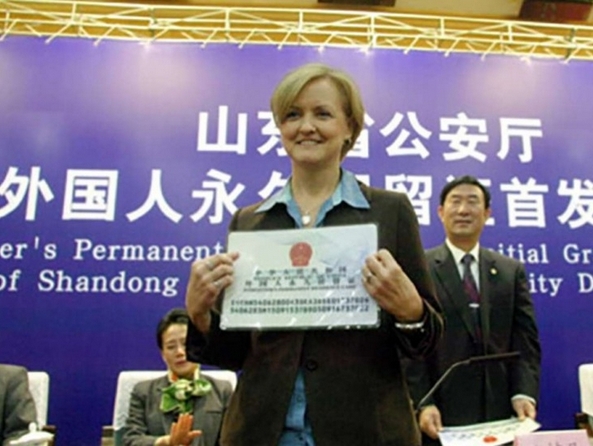Policies should be streamlined to attract overseas talents
- By Hu Bengang
 0 Comment(s)
0 Comment(s) Print
Print E-mail China.org.cn, March 8, 2017
E-mail China.org.cn, March 8, 2017
|
|
|
A foreigner was given a Chinese green card. |
China should loosen its policies for issuing permits to foreigners for residency and working in China by simplifying application process and prolong the validity of related permits.
A country of great competency is one with openness, as exemplified by the history of the United States. It is not only about an open market for foreign resources, funds, technologies and equipment, but also for precious talents.
If China wants to keep pace, it needs to recruit more foreign talents and foreign workers when it tries to move away from the overlapping low-end manufacturing and improve the currently insufficient high-end production. But the current policies are still considered to be too stringent and not conducive to facilitating the flow of such talents.
For instance, one of the policies requires that overseas applicants for Chinese residence or employment permits should be younger than 60. But many foreigners, usually do not retire at that age.
In my view, China should loosen its policies by lifting restrictions on foreign applicants' age and educational qualifications, streamlining procedures and extending validity periods of relevant permits.
In many European countries, many factories are composed of graduates from technical schools -- the educational background which China lacks. Because of this, our industrial products lag far behind the developed world -- with the minute quality differences adding up to form huge gaps. For example, Chinese bearings keep spinning for a much shorter period than those made from European manufacturers.
To narrow the distance, China needs to attract experienced technicians. Not long ago, Midea, one of China's home appliance suppliers, purchased a significant stake in KUKA, a German manufacturer of industrial robotics. Midea anticipated that the takeover would help it lower manufacturing costs and pave the way for its smart products entering the global market. But the problem is: could KUKA's employees come to China soon after the acquisition?
While we complain about barriers set by foreign countries concerning their cutting-edge technologies, we are, however, restraining ourselves with unnecessary restrictions.
Enterprises instead of the government should be the first party responsible for risk control, such as the foreign employees' health conditions. Meanwhile, parental companies should control the procedures required for the employment of foreign employees for not only their own office, but also for its subsidiaries, which would standardize applications.
Despite China's stringent regulations for green card applications, the authorities can still do more to increase the efficiency of administrative procedures.
We should especially strengthen exchanges with foreign markets during an era of surging industrial and agricultural costs in China, while similar costs from the rest of the world are declining.
Last year witnessed a large increase in the number of expatriates accredited with the green card in China, with the number growing to more than 1,500. However, the size remains exponentially smaller than that of the United States, which issues about 100,000 green cards to foreign technicians each year.
The author is a non-resident senior fellow of the Center for China and Globalization.
The article was translated by Wu Jin and its original unabridged version was published in Chinese.
Opinion articles reflect the views of their authors, not necessarily those of China.org.cn.







Go to Forum >>0 Comment(s)